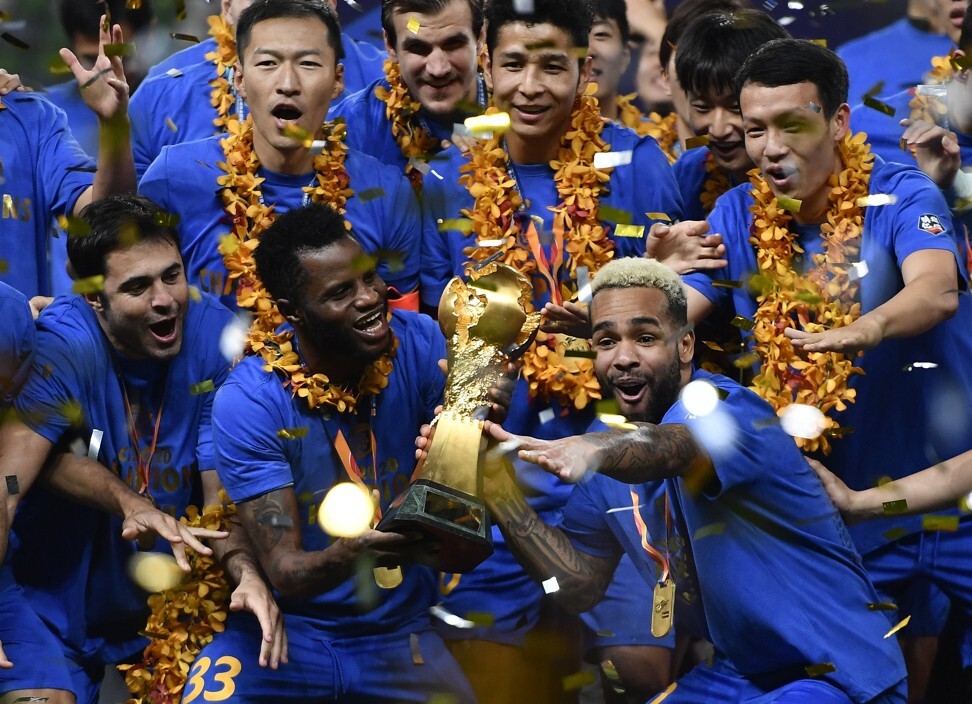
The day football dyed is no laughing matter – the salad days of the Chinese game are gone, probably for good
- Authorities in China are continually the butt of the football world’s jokes with bizarre rules and unusual bans
- CSL clubs may no longer have their super millions to ensure they’re taken seriously
If October 2, 2018, was the day Chinese football died, then December 5, 2020, was the day it dyed.
That was the date of the latest scandal from China to make headlines around the world; a women’s university game in Fujian province between the teams of Fuzhou University and Jimei University that never happened.
After checking players for correct footwear, full kit, shin pads and jewellery, the officials then turned to their hair.
Several players on both sides were found to have dyed hair, which was against the rules, and despite the best efforts of team staff to dye it back, Fuzhou could not field the minimum of seven players handing the win to Jimei.
The rule does not only ban hair dye. “Athletes at all stages shall not have tattoos, dye their hair, wear weird hairstyles, or wear any accessories, otherwise they will be ineligible for the competition,” state the rules from the organisers, the National Youth Campus Football League (University Division).
Understandably the farce sparked debate over the point of such rules among Chinese social media users, and, understandably, it sparked laughter across the world.
Chinese football is a bigger laughing stock than even its Fifa ranking deserves
What it probably did not spark is discussion at the Chinese Football Association as to how they can stop such making such headlines?
Chinese football is a bigger laughing stock than even its Fifa ranking deserves.
A perpetually failing football team is indeed a national embarrassment while the sport remains the world game, but the rest of these headlines are entirely self-inflicted.
Neymar, Messi and Ronaldo are proof that tattoos, hair dye and terrible haircuts are probably not that important, but if it is not needless rulings, it is hare-brained schemes.
There have been headline grabbing punishments, too. A thumbs up? That’s two matches. Wearing a necklace on national duty? Sit out for 12 months. Touching your face during the national anthem? That will be a match.
These stories make the headlines but others over the last week have been more revealing.

Firstly, Hulk leaving Shanghai SIPG is something of the end of an era, or at least the beginning of the end.
The burly Brazilian arrived in June 2016 when the world started tuning into Chinese football because of the massive expenditure and even bigger names arriving in the league.
Hulk followed February arrival Alex Teixeira and was joined in Shanghai by Asia record signing Oscar that December. The trio – Teixeira had been linked to Liverpool while the others were experienced Brazil internationals – defined the league’s desire at the time.
Now almost 18 months on from Jiangsu Suning’s audacious attempt to sign Gareth Bale, the biggest names arriving are Aaron Mooy and Marko Arnautovic at SIPG.
Both fine players and experienced internationals that did well in the English Premier League but they lack the pizazz of days past. These are the dying days of headline signings.
Teixeira could join Mooy, Arnautovic and Oscar at SIPG next season, according to reports, with the Jiangsu striker also a target for naturalisation.
It means that naturalisation, while controversial, remains the short cut of choice to give China a chance at qualifying for the next Fifa World Cup in Qatar in two years. It certainly presents an answer to how China can find its 11 players – just make them Chinese.
Money is said to be an issue with the Teixeira switch as domestic player salaries are capped lower than foreigners and money is a matter of interest across the league.

Some have suggested that this is a way for the Chinese FA to let sponsors walk away from clubs without losing face. Clubs are money pits and the investments, even curtailed by new spending limits, are not paying off. This gives them an out but money flooding out of the game would be another step back.
While the bizarre stories will continue to make the headlines, the truth is that the future of Chinese football is no laughing matter.

